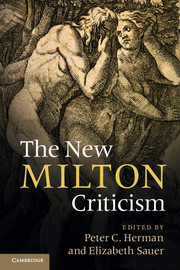Book contents
- Frontmatter
- Contents
- Notes on contributors
- Acknowledgments
- Note on editions
- Introduction Paradigms lost, paradigms found: the New Milton Criticism
- Part I Theodicies
- Chapter 1 Milton’s fetters, or, why Eden is better than Heaven
- Chapter 2 “Whose fault, whose but his own?”
- Chapter 3 The political theology of Milton’s Heaven
- Chapter 4 Meanwhile: (un)making time in Paradise Lost
- Chapter 5 The Gnostic Milton: salvation and divine similitude in Paradise Regained
- Chapter 6 Discontents with the Drama of Regeneration
- Part II Critical receptions
- Index
- References
Chapter 3 - The political theology of Milton’s Heaven
Published online by Cambridge University Press: 05 June 2012
- Frontmatter
- Contents
- Notes on contributors
- Acknowledgments
- Note on editions
- Introduction Paradigms lost, paradigms found: the New Milton Criticism
- Part I Theodicies
- Chapter 1 Milton’s fetters, or, why Eden is better than Heaven
- Chapter 2 “Whose fault, whose but his own?”
- Chapter 3 The political theology of Milton’s Heaven
- Chapter 4 Meanwhile: (un)making time in Paradise Lost
- Chapter 5 The Gnostic Milton: salvation and divine similitude in Paradise Regained
- Chapter 6 Discontents with the Drama of Regeneration
- Part II Critical receptions
- Index
- References
Summary
Readers of Paradise Lost have long struggled to understand the apparent tension between Milton’s uncompromising commitment to a non-monarchic politics, as evidenced in the regicide tracts, and the decidedly monarchic structure of what seems to be the exemplary polity of the poem’s Heaven. The God of Paradise Lost is not just a father, but a king, a king, in fact, who may share an awkward affinity with the absolutist sovereigns against whom Milton had inveighed so passionately in such treatises as The Tenure of Kings and Magistrates and Eikonoklastes at mid century. The interpretive problem that Milton’s representation of God as king has posed to critics is a familiar one, and is felt almost immediately by the epic’s readers. Might the unquestionably monarchic structure of Milton’s Heaven work to elevate kingship – earthly kingship – in spite of the anti-monarchic commitments proclaimed so eloquently in those treatises composed from 1649 to 1652? Or might the divine monarchism of the epic function, as William Empson argued so provocatively, to derogate the poem’s God, to force an oblique questioning of the “ways of God” that Paradise Lost, at least at an explicit level, claimed at its opening that it would labor to justify?
Two of the liveliest and most acute critics of Milton’s poem have recently taken up these central questions concerning the critical interpretation of the politics of Heaven. Michael Bryson and Peter C. Herman both point out that the dominant critical tendency among scholars of Milton has been to avoid the notorious conclusions of Empson’s interpretation: critics of the last forty-five years have tended rather to argue for the sheer incommensurability between earthly and heavenly sovereignty. As Herman notes, “the most common strategy for imposing political stability onto Paradise Lost is the assertion, in [Barbara] Lewalski’s formulation, that ‘there can be no possible parallel between earthly kings and divine kingship’” (p. 84). The king of Heaven, and only the king of Heaven, is thus entitled to displays of arbitrary monarchic authority. Any comparison of Milton’s God with a similarly absolutist Charles, or even Cromwell, here on earth, it has further been argued, far from diminishing the sanctity or the authority of deity, can only shine an unflattering light on the presumptive Satanic arrogance of the earthly imitator of Heaven’s monarch.
- Type
- Chapter
- Information
- The New Milton Criticism , pp. 68 - 84Publisher: Cambridge University PressPrint publication year: 2012



